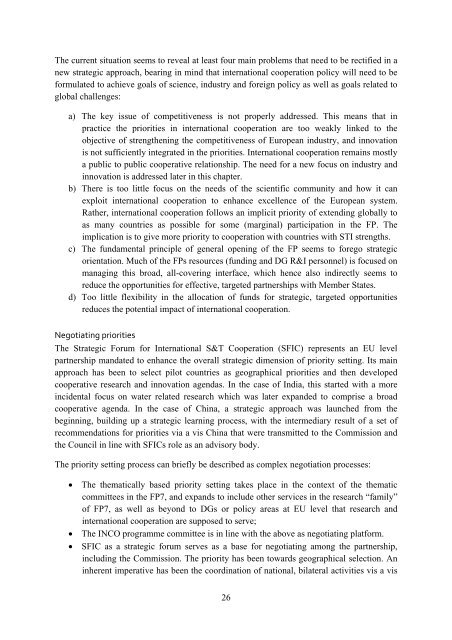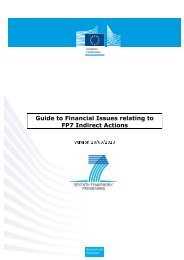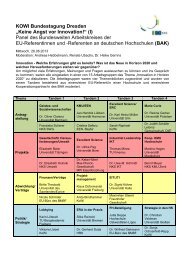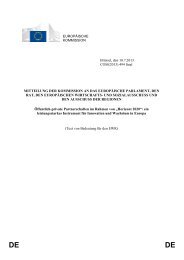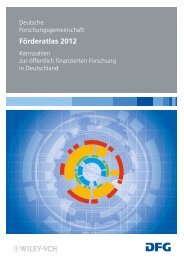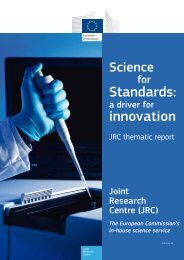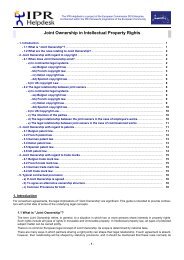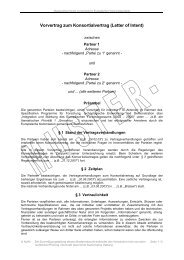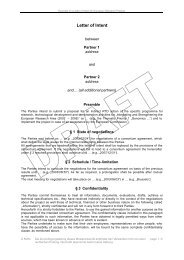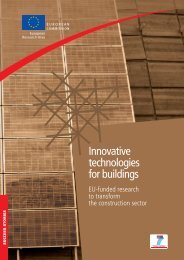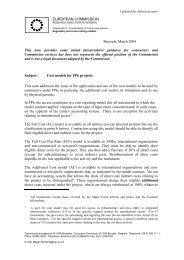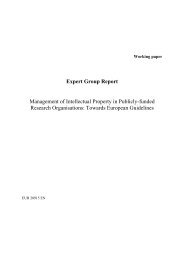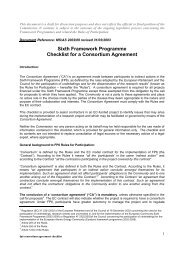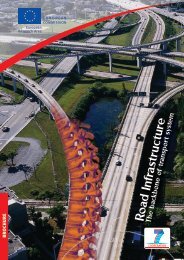Draft Report of the Expert Group on International STI Cooperation to ...
Draft Report of the Expert Group on International STI Cooperation to ...
Draft Report of the Expert Group on International STI Cooperation to ...
Create successful ePaper yourself
Turn your PDF publications into a flip-book with our unique Google optimized e-Paper software.
The current situati<strong>on</strong> seems <strong>to</strong> reveal at least four main problems that need <strong>to</strong> be rectified in a<br />
new strategic approach, bearing in mind that internati<strong>on</strong>al cooperati<strong>on</strong> policy will need <strong>to</strong> be<br />
formulated <strong>to</strong> achieve goals <str<strong>on</strong>g>of</str<strong>on</strong>g> science, industry and foreign policy as well as goals related <strong>to</strong><br />
global challenges:<br />
a) The key issue <str<strong>on</strong>g>of</str<strong>on</strong>g> competitiveness is not properly addressed. This means that in<br />
practice <str<strong>on</strong>g>the</str<strong>on</strong>g> priorities in internati<strong>on</strong>al cooperati<strong>on</strong> are <strong>to</strong>o weakly linked <strong>to</strong> <str<strong>on</strong>g>the</str<strong>on</strong>g><br />
objective <str<strong>on</strong>g>of</str<strong>on</strong>g> streng<str<strong>on</strong>g>the</str<strong>on</strong>g>ning <str<strong>on</strong>g>the</str<strong>on</strong>g> competitiveness <str<strong>on</strong>g>of</str<strong>on</strong>g> European industry, and innovati<strong>on</strong><br />
is not sufficiently integrated in <str<strong>on</strong>g>the</str<strong>on</strong>g> priorities. Internati<strong>on</strong>al cooperati<strong>on</strong> remains mostly<br />
a public <strong>to</strong> public cooperative relati<strong>on</strong>ship. The need for a new focus <strong>on</strong> industry and<br />
innovati<strong>on</strong> is addressed later in this chapter.<br />
b) There is <strong>to</strong>o little focus <strong>on</strong> <str<strong>on</strong>g>the</str<strong>on</strong>g> needs <str<strong>on</strong>g>of</str<strong>on</strong>g> <str<strong>on</strong>g>the</str<strong>on</strong>g> scientific community and how it can<br />
exploit internati<strong>on</strong>al cooperati<strong>on</strong> <strong>to</strong> enhance excellence <str<strong>on</strong>g>of</str<strong>on</strong>g> <str<strong>on</strong>g>the</str<strong>on</strong>g> European system.<br />
Ra<str<strong>on</strong>g>the</str<strong>on</strong>g>r, internati<strong>on</strong>al cooperati<strong>on</strong> follows an implicit priority <str<strong>on</strong>g>of</str<strong>on</strong>g> extending globally <strong>to</strong><br />
as many countries as possible for some (marginal) participati<strong>on</strong> in <str<strong>on</strong>g>the</str<strong>on</strong>g> FP. The<br />
implicati<strong>on</strong> is <strong>to</strong> give more priority <strong>to</strong> cooperati<strong>on</strong> with countries with <strong>STI</strong> strengths.<br />
c) The fundamental principle <str<strong>on</strong>g>of</str<strong>on</strong>g> general opening <str<strong>on</strong>g>of</str<strong>on</strong>g> <str<strong>on</strong>g>the</str<strong>on</strong>g> FP seems <strong>to</strong> forego strategic<br />
orientati<strong>on</strong>. Much <str<strong>on</strong>g>of</str<strong>on</strong>g> <str<strong>on</strong>g>the</str<strong>on</strong>g> FPs resources (funding and DG R&I pers<strong>on</strong>nel) is focused <strong>on</strong><br />
managing this broad, all-covering interface, which hence also indirectly seems <strong>to</strong><br />
reduce <str<strong>on</strong>g>the</str<strong>on</strong>g> opportunities for effective, targeted partnerships with Member States.<br />
d) Too little flexibility in <str<strong>on</strong>g>the</str<strong>on</strong>g> allocati<strong>on</strong> <str<strong>on</strong>g>of</str<strong>on</strong>g> funds for strategic, targeted opportunities<br />
reduces <str<strong>on</strong>g>the</str<strong>on</strong>g> potential impact <str<strong>on</strong>g>of</str<strong>on</strong>g> internati<strong>on</strong>al cooperati<strong>on</strong>.<br />
Negotiating priorities<br />
The Strategic Forum for Internati<strong>on</strong>al S&T Cooperati<strong>on</strong> (SFIC) represents an EU level<br />
partnership mandated <strong>to</strong> enhance <str<strong>on</strong>g>the</str<strong>on</strong>g> overall strategic dimensi<strong>on</strong> <str<strong>on</strong>g>of</str<strong>on</strong>g> priority setting. Its main<br />
approach has been <strong>to</strong> select pilot countries as geographical priorities and <str<strong>on</strong>g>the</str<strong>on</strong>g>n developed<br />
cooperative research and innovati<strong>on</strong> agendas. In <str<strong>on</strong>g>the</str<strong>on</strong>g> case <str<strong>on</strong>g>of</str<strong>on</strong>g> India, this started with a more<br />
incidental focus <strong>on</strong> water related research which was later expanded <strong>to</strong> comprise a broad<br />
cooperative agenda. In <str<strong>on</strong>g>the</str<strong>on</strong>g> case <str<strong>on</strong>g>of</str<strong>on</strong>g> China, a strategic approach was launched from <str<strong>on</strong>g>the</str<strong>on</strong>g><br />
beginning, building up a strategic learning process, with <str<strong>on</strong>g>the</str<strong>on</strong>g> intermediary result <str<strong>on</strong>g>of</str<strong>on</strong>g> a set <str<strong>on</strong>g>of</str<strong>on</strong>g><br />
recommendati<strong>on</strong>s for priorities via a vis China that were transmitted <strong>to</strong> <str<strong>on</strong>g>the</str<strong>on</strong>g> Commissi<strong>on</strong> and<br />
<str<strong>on</strong>g>the</str<strong>on</strong>g> Council in line with SFICs role as an advisory body.<br />
The priority setting process can briefly be described as complex negotiati<strong>on</strong> processes:<br />
• The <str<strong>on</strong>g>the</str<strong>on</strong>g>matically based priority setting takes place in <str<strong>on</strong>g>the</str<strong>on</strong>g> c<strong>on</strong>text <str<strong>on</strong>g>of</str<strong>on</strong>g> <str<strong>on</strong>g>the</str<strong>on</strong>g> <str<strong>on</strong>g>the</str<strong>on</strong>g>matic<br />
committees in <str<strong>on</strong>g>the</str<strong>on</strong>g> FP7, and expands <strong>to</strong> include o<str<strong>on</strong>g>the</str<strong>on</strong>g>r services in <str<strong>on</strong>g>the</str<strong>on</strong>g> research “family”<br />
<str<strong>on</strong>g>of</str<strong>on</strong>g> FP7, as well as bey<strong>on</strong>d <strong>to</strong> DGs or policy areas at EU level that research and<br />
internati<strong>on</strong>al cooperati<strong>on</strong> are supposed <strong>to</strong> serve;<br />
• The INCO programme committee is in line with <str<strong>on</strong>g>the</str<strong>on</strong>g> above as negotiating platform.<br />
• SFIC as a strategic forum serves as a base for negotiating am<strong>on</strong>g <str<strong>on</strong>g>the</str<strong>on</strong>g> partnership,<br />
including <str<strong>on</strong>g>the</str<strong>on</strong>g> Commissi<strong>on</strong>. The priority has been <strong>to</strong>wards geographical selecti<strong>on</strong>. An<br />
inherent imperative has been <str<strong>on</strong>g>the</str<strong>on</strong>g> coordinati<strong>on</strong> <str<strong>on</strong>g>of</str<strong>on</strong>g> nati<strong>on</strong>al, bilateral activities vis a vis<br />
26


